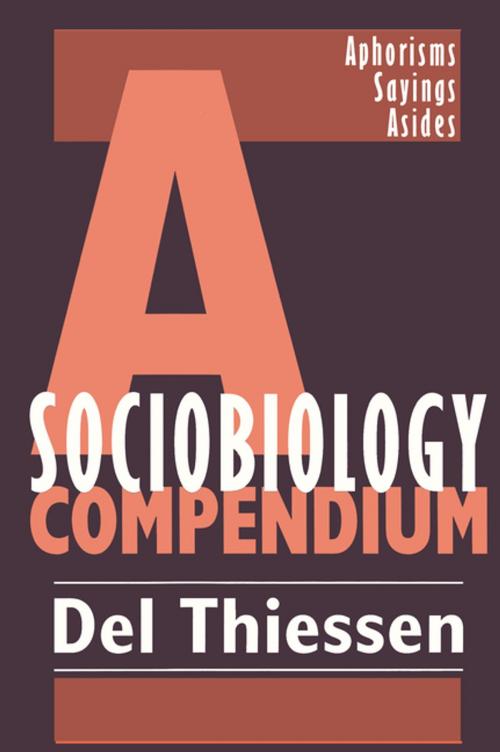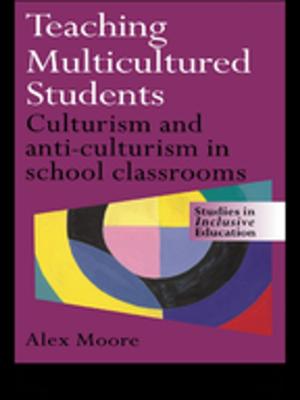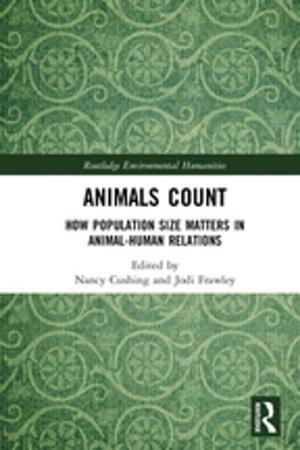A Sociobiology Compendium
Aphorisms, Sayings, Asides
Nonfiction, Social & Cultural Studies, Social Science, Anthropology| Author: | Del Thiessen | ISBN: | 9781351290340 |
| Publisher: | Taylor and Francis | Publication: | November 30, 2017 |
| Imprint: | Routledge | Language: | English |
| Author: | Del Thiessen |
| ISBN: | 9781351290340 |
| Publisher: | Taylor and Francis |
| Publication: | November 30, 2017 |
| Imprint: | Routledge |
| Language: | English |
The novelist Joseph Conrad expressed a great truth when he said: "The mind of man is capable of anything--because everything is in it, all the past as well as the future," Our evolutionary history of noble acts and foul deeds, leading to survival and reproduction, guarantees that we understand the most essential facets of our physical and social environment. The nature of our struggles--our lusts, our fears, our objectivity, our irra-tionality--lies embedded in our cellular DNA and the neurons of our mind, there to play itself out much like it did in the past and much like it will in the future.
Many have seen the links between our minds and the universe, the common thread of our existence and the inevitability of our loves and hates. This book includes many demonstrations that our nature has been on the minds and lips of many--poets, play-wrights, philosophers, historians, novelists, kings, slaves, religious leaders, and the great-est of knaves. From Ralph Waldo Emerson to Arthur Schopenhauer, from Aldous Huxley to Arthur Conan Doyle, from Aristotle to William Shakespeare, the truths about our-selves have come tumbling out. Reflecting on their thoughts we see ourselves. The universal nature of our being reflects our common origins and our bittersweet destiny.
In A Sociobiology Compendium, Del Thiessen mines the richness of biological inves-tigations of human behavior, comparing current views of human behavior with expres-sions by non-scientists who have, in one way or another, touched the evolutionary strings of men and women. He begins each section with a brief account of biological notions of human behavior. The book shows in astonishing ways how the earlier thoughts of men and women from all cultures anticipate the biological observations about our being. A Sociobiology Compendium will be engaging reading for all psychologists, sociologists, and biologists.
The novelist Joseph Conrad expressed a great truth when he said: "The mind of man is capable of anything--because everything is in it, all the past as well as the future," Our evolutionary history of noble acts and foul deeds, leading to survival and reproduction, guarantees that we understand the most essential facets of our physical and social environment. The nature of our struggles--our lusts, our fears, our objectivity, our irra-tionality--lies embedded in our cellular DNA and the neurons of our mind, there to play itself out much like it did in the past and much like it will in the future.
Many have seen the links between our minds and the universe, the common thread of our existence and the inevitability of our loves and hates. This book includes many demonstrations that our nature has been on the minds and lips of many--poets, play-wrights, philosophers, historians, novelists, kings, slaves, religious leaders, and the great-est of knaves. From Ralph Waldo Emerson to Arthur Schopenhauer, from Aldous Huxley to Arthur Conan Doyle, from Aristotle to William Shakespeare, the truths about our-selves have come tumbling out. Reflecting on their thoughts we see ourselves. The universal nature of our being reflects our common origins and our bittersweet destiny.
In A Sociobiology Compendium, Del Thiessen mines the richness of biological inves-tigations of human behavior, comparing current views of human behavior with expres-sions by non-scientists who have, in one way or another, touched the evolutionary strings of men and women. He begins each section with a brief account of biological notions of human behavior. The book shows in astonishing ways how the earlier thoughts of men and women from all cultures anticipate the biological observations about our being. A Sociobiology Compendium will be engaging reading for all psychologists, sociologists, and biologists.















